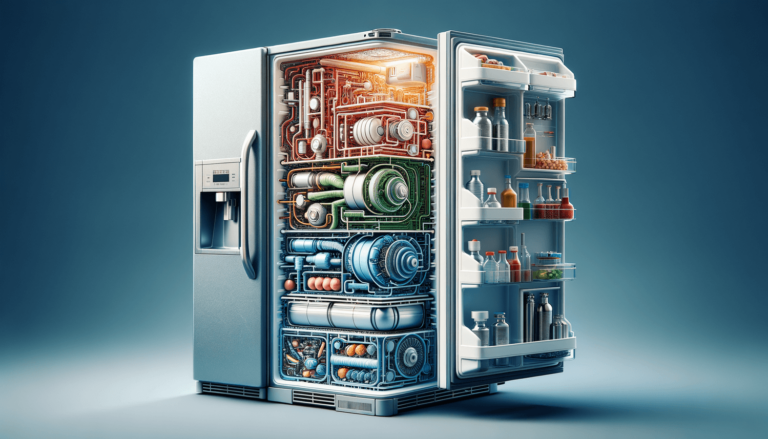

A refrigerator works by transferring the heat from the inside of the unit to the outside, keeping your food cool and fresh. At its core, a refrigerator uses the principles of evaporation and condensation, involving a refrigerant that circulates through coils and changes from gas to liquid. This process is driven by several key components including a compressor, condenser coils, evaporator coils, and an expansion device. The compressor compresses the refrigerant, raising its pressure and temperature. It then flows through the condenser coils where it loses heat and condenses into a liquid. The liquid refrigerant then passes through an expansion device, reducing its pressure and temperature before entering the evaporator coils. Here, it absorbs heat from the refrigerator’s interior, cools the air inside, and evaporates back into a gas. This cycle repeats continuously to keep your food cool.
Quick Summary
Understanding the refrigeration cycle is crucial to comprehending how refrigerators keep your food fresh. Here at Setting King, we break down complex processes into simple explanations. The cycle starts when the compressor compresses the refrigerant. This compressed refrigerant, now hot from the compression, flows through the condenser coils located on the outside of the refrigerator. As the refrigerant cools, it transforms into a liquid.
Next, this liquid passes through an expansion device, which causes a rapid decrease in pressure. This sudden drop in pressure cools the refrigerant even further, preparing it for its vital role in cooling the refrigerator’s interior. As the now cool, low-pressure liquid refrigerant enters the evaporator coils, it absorbs the heat from the interior of the refrigerator, thereby lowering the air temperature inside the unit.
The refrigerant, having absorbed the heat, evaporates and turns back into a gas. It then returns to the compressor to begin the cycle anew. This cycle is what consistently maintains a cold environment inside your refrigerator.
The compressor is the heart of the refrigerator’s cooling system. It compresses the refrigerant, increasing its temperature and pressure, and propels it through the system.
These coils are located on the back or bottom of the refrigerator. They release the heat carried by the refrigerant into the outside air.
Located inside the refrigerator, these coils carry the cool, low-pressure refrigerant. As air from the refrigerator’s interior circulates over these coils, the refrigerant absorbs the heat, cools the air, and evaporates.
This device reduces the pressure of the refrigerant, cooling it further before it enters the evaporator coils. It’s a critical component in regulating the refrigerant’s flow through the system.
At Setting King, we believe in empowering our readers with knowledge not just on how things work but also on how to keep them working. Maintaining your refrigerator ensures it operates efficiently and extends its lifespan. Here are some trusted tips:
Understanding how a refrigerator works and the roles of its components can help you appreciate this critical appliance more and take better care of it. By following the maintenance tips provided, you can ensure your refrigerator continues to serve you well for years to come.